
As a mum, it's normal for looking after your baby to be your main concern after birth - but we're here to remind you to look after yourself too. The only way you can be there 100% for your little one to give them the best care is to be well yourself first. Both your health and your baby's health depend on how well you feel. So today we're talking about postpartum care: what to expect and other helpful pointers to help you recover as efficiently as possible.
Postpartum - What does this period mean and how long does it last?
The postpartum period (in the popular name, lauzie) refers to the 6 weeks after birth, when the mother's body and all organs return to their normal form, i.e. to the one before pregnancy.
It starts immediately after the moment of birth and can last up to 6 weeks, respectively until the menstrual cycle also returns to normal. It is a time of recovery and healing, which involves a lot of changes both physically and emotionally. Changes that we will try to cover as much as possible in this article so that you are prepared and know what to expect.
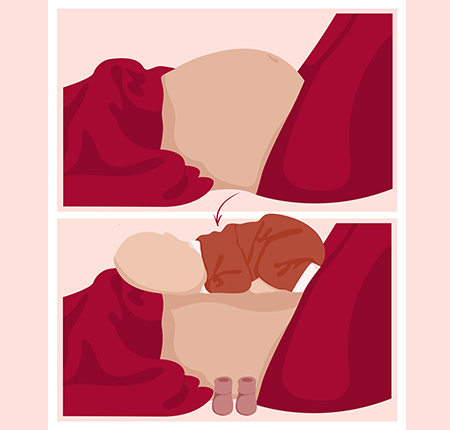
What postpartum expectations you should have depending on the type of birth
Depending on how you gave birth, the postpartum period will be a little different. There are things like recovery and hospital time that can be different after a natural birth than a C-section. Let's see what the main differences are.
Postpartum care after natural birth
Although the birth itself is more painful vaginally than a C-section, your body recovers faster after a natural birth and the recovery is also less painful.
Depending on how you feel, you can get out of bed just a few hours after giving birth. The sooner you get up after a natural birth, the better it is to prevent possible complications. Because from the upright position, gravity helps the organs to settle into their natural positions and the body to more easily eliminate vaginal bleeding (lochia) and gases to resume its intestinal transit.
You'll need a little help at first, but gradually it will get easier. It is recommended to drink fluids before getting up to avoid hypovolemia. Hospitalization is generally shorter after a natural birth, and recovery is often complete no more than 6 weeks after birth.
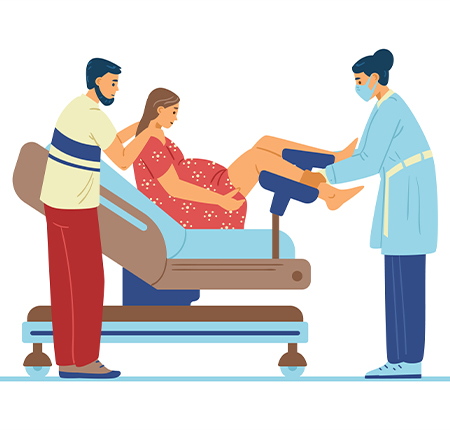
Stitching after natural birth
If you had an episiotomy during your natural birth (that small surgical incision under local anesthesia that prevents tears and tears in the perineum and supports the expulsion of the baby), the stitch after birth is to repair the cut made during this procedure.
If you still don't know how or how long the threads dissolve after birth, the suture threads will absorb on their own quickly, usually within 2-4 weeks. But the wound itself can cause discomfort when you walk or sit down. Tenderness and pain may last for several weeks, or even longer if the incision was large. Hygiene is very important during this period to prevent infections.
Applying cold compresses, keeping the area dry, and using pain relievers (be careful, only with your doctor's approval, as they can interfere with your breastfeeding) can help reduce discomfort. If you experience unusual pains or smells, if you have a fever, a burning sensation every time you walk, or any other abnormal symptom, talk to your doctor as soon as possible.
It's important to remember, however, that every body is different and has its own healing rhythm. So it's normal if your experiences are different after a natural birth and after such a stitch.
Postpartum care after caesarean section
As I said above, even if during cesarean birth the pain is little or non-existent, here the recovery is the most difficult, both in terms of pain level and recovery time. Getting out of bed is done in three stages, namely the sitting up, the lifting at the edge of the bed, and only then the standing up and the first steps, likewise, assisted.
It can take 6 to 8 weeks to fully recover from surgery, and a longer hospital stay is needed than with natural birth. There is also the local pain that you can feel at the level of the incision. Also, mothers who have given birth by caesarean section will be advised to avoid bending over or lifting weights. 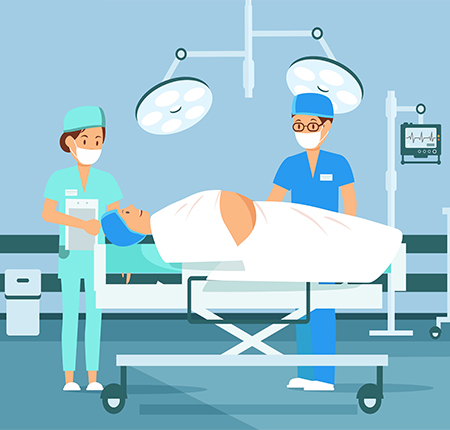
Other than these details, however, the rest of the postpartum symptoms are similar to those after a normal birth: vaginal and full-body pain, enlarged breasts, and vaginal bleeding.
What should you expect immediately after giving birth (at the hospital)?
Immediately after birth, doctors will monitor you for at least an hour. This time can be extended to several hours if you were under anesthesia or if there were complications. The temperature and pulse will be checked, which is normal to be different in the first 24 hours after birth (pulse should drop back to normal, temperature should be slightly higher). Usually all these things return to normal after a few days.
Also, during the hospitalization, the medical personnel will be there to help you if the pain is very great or if the bleeding is too profuse.
We know you want to recover as soon as possible, hold your baby and go home. But it's important to have realistic expectations and be patient with yourself. Each body has its own rhythm to recover, to return to its usual form. And the entire hospital stay is about making sure your body is on the right track to a speedy and uncomplicated recovery.
With these aspects in mind, here's what you can expect right after birth, during your hospital stay:
Bleeding
It's normal to bleed after giving birth, but it's a priority for doctors to make sure you lose as little blood as possible to prevent anemia. The more the uterus continues to contract, the more excessive bleeding is avoided.
Therefore, a nurse may constantly massage your abdomen to stimulate uterine contractions, or you may be given intravenous or intramuscular oxytocin until the uterus contracts.
Postpartum urination
Temporarily, after giving birth, it is normal to urinate more. You may also not yet feel the sensation of a full bladder, which is why healthcare professionals will encourage you to urinate frequently, at least every 4 hours, thus preventing bladder fullness and the infections it can cause. Also in this context, the staff can gently press on your abdomen to check if the bladder has been completely emptied.
If you are unable to urinate, as I said, the bladder remains full and this can lead to complications. To avoid this situation, you may have a tube temporarily inserted until your bladder empties.
Avoiding constipation
The hospital staff will encourage you to have at least one chair before you are discharged. But if the hospitalization lasts less than 3 days, then it is recommended to use a laxative if you are unable to pass a stool within 3 days.
It is crucial to avoid constipation after childbirth, which can cause or worsen hemorrhoids. Additionally, laxatives or stool softeners are especially given if the muscles around the anus or rectum have been torn during childbirth to avoid pressure building up in that area.
Diet & Exercise
Usually, very soon after giving birth you can go back to your normal diet and eat whatever you want. Of course, a balanced and light diet is recommended to avoid constipation or other digestive problems.
Regarding movement, as we told you above, it is recommended to get out of bed and walk as soon as possible after a normal birth. The same as after caesarean section, but respecting the 3 stages. As for exercise, it is advisable not to return to regular training until you receive the doctor's approval.
After an uncomplicated vaginal birth, you can usually start abdominal strengthening exercises even after just one day. After a C-section, on the other hand, you will need to give yourself time to heal. Which means your doctor may recommend waiting around 6 weeks before starting various forms of exercise.
Belly after birth
The tone and shape of the abdomen was affected during pregnancy, which is why you can be left with a belly after giving birth (“postpartum belly”). It is normal for it not to return to its previous appearance immediately after birth. Your body has gone through and continues to go through a lot of changes, and stretch marks and the "leftover" look are natural.
They can be influenced by a lot of factors such as breastfeeding, hormonal fluctuations (estrogen and progesterone), fat tissue, water retention or the expansion of the uterus. All these factors, however, are also the ones that restore your body during the recovery process to return as close as possible to the original shape.
Abdominal recovery and toning time varies from woman to woman, depending on:
how toned you were at the abdominal level before you got pregnant;
how healthy was your diet;
if you follow a special exercise program;
weight gained during pregnancy;
type of birth (caesarean or vaginal);
whether or not you had complications at birth.
But in general, the appearance will improve within a few weeks after birth and will completely return to its original shape after 6-12 months. The process can be accelerated with gradual training under the supervision of a specialist, but it is extremely important to understand yourself and give yourself the necessary time, without judging yourself. Your body has gone through a lot of changes and it is normal for it to take time to fully recover.
How many days are you in the hospital after giving birth?
Normally, if there are no complications, after a normal vaginal delivery, hospitalization lasts at least 24 hours. Most mothers are hospitalized, however, for about 2 days.
Since the recovery after cesarean is a little longer, the hospital stay will last between 2 and 4 days on average. During this time, you may receive medication to relieve your pain.
Throughout your hospital stay, the sooner you get up and start walking, the more you will prevent complications and the faster the recovery process will be.
Postpartum at home - What to expect?
The fact that the doctors have discharged you from the hospital does not mean that you are completely cured, just that you are on the right track to a full recovery. So again, regardless of the type of birth, caring for your body should continue after you get home.
You can still expect to go through a lot of changes and experiences, both physical and emotional. You may also have medical restrictions, so you need to be clear with your doctor about what you can and can't do.
For example, you are allowed to shower even after a cesarean delivery, just be careful not to insist on the incision area. You wash with gentle movements, from front to back, to avoid spreading infections. Bathing, on the other hand, is not allowed until the healing is complete. Likewise, vaginal douching or inserting tampons are prohibited until the doctor tells you that you have fully recovered. And sexual activity is generally avoided for the first 6 weeks.
The only one who can give you the best recommendations based on your birth and how your body is recovering is your doctor. So feel free to talk to him and ask him all the questions, because it's about your health and your ability to take care of yourself and your baby. Beyond that, we can tell you below what other things are normal and you can expect postpartum after you return home.
Postnatal / postpartum depression
The whole experience of becoming a mother, from the moment you found out you were pregnant, through the pregnancy period to the birth, was an emotional rollercoaster full of physical changes. After the birth, your status also changes - you finally became a mother. It's no longer something you think about in the future, it's happening in the present. You realize how much your little one depends on you, and this new status as a mother, the responsibility that comes with it and all these new feelings, can be overwhelming.
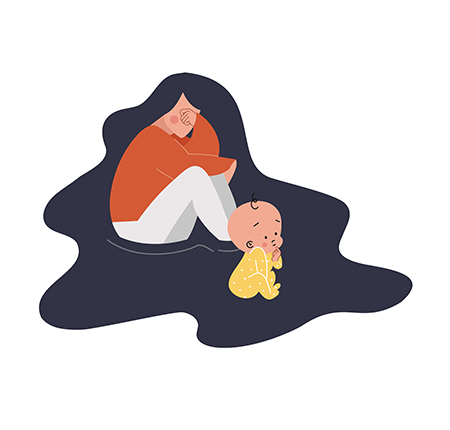
In the first few days after birth, such emotions are perfectly normal and you shouldn't beat yourself up about them too much. But if the symptoms of postpartum depression persist for more than 2 weeks and you feel that you are losing interest and energy in daily activities, to take care of yourself and the newborn, then it is time to seek the help of a specialist.
It is equally important to know that you are not alone. Postnatal depression and those "baby blues" are disorders that many parents face, which you are prone to if you have had depression before and which can be overcome with a little help.
Lochia (vaginal discharge after childbirth)
Those vaginal discharges that start in the first days after birth and can last up to 4-6 weeks are called lochia. Especially in the first few days, they can look like a heavier period because they have a higher blood content. But it's actually just remnants of the uterine membrane mixed with blood, perfectly normal as long as you don't notice very large clots, and you don't have to change the pad every hour.
A few other things to keep in mind to take care of yourself while you have these lochia are:
Do not use postpartum tampons: only absorbent ones, to reduce the risk of infections;
Choose postpartum organic pads that won't cause allergies or irritation: depending on your flow, choose one of 3 sizes of our 100% organic cotton pads for natural and safe protection.
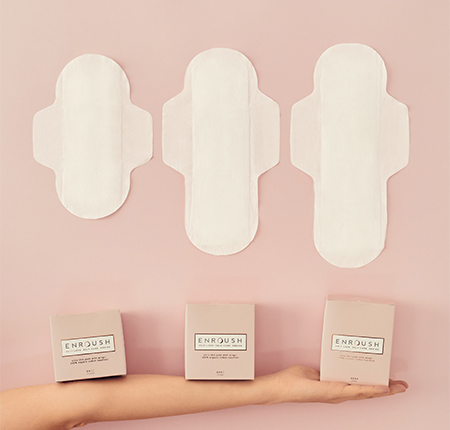
Consume as many iron-rich foods as possible: green leafy vegetables (e.g. spinach), lentils, chickpeas, dried fruits, etc.
If you have foul-smelling postpartum discharge, large blood clots, or very heavy flow, contact your doctor immediately.
Pain in the vagina
Pain in the vaginal area after a natural birth is normal for the first 24 hours, and cold compresses, creams or anesthetic sprays are often used to relieve it. Even more so if you had an episiotomy or have vaginal injuries, the wound may persist even for several weeks. You may also feel a stinging sensation when urinating, or tenderness when sitting down.
After the first 24 hours, a sitz bath can also help, or you can wash with warm water 2-3 times a day around the vaginal area to reduce sensitivity and pain. Also, if the doctor agrees, you can use lavender essential oil or other alternative treatments to reduce pain.
breast-feeding
Depending on the situation and personal preferences, you can choose to breastfeed your baby or with a bottle. If you choose to breastfeed, doctors recommend that you do it without other supplements for 6 months, after which you can gradually start introducing other foods. During this time you can continue breastfeeding until the little one loses interest.
The way you position your baby is also very important. If you breastfeed in the wrong position, or if the little one misplaces his lower lip, pain and cracks in the nipples can occur. In this case, and also when you want to stop breastfeeding, first put your thumb in the baby's mouth to stop him sucking, and only then remove it. This way you will avoid injuring your breast.
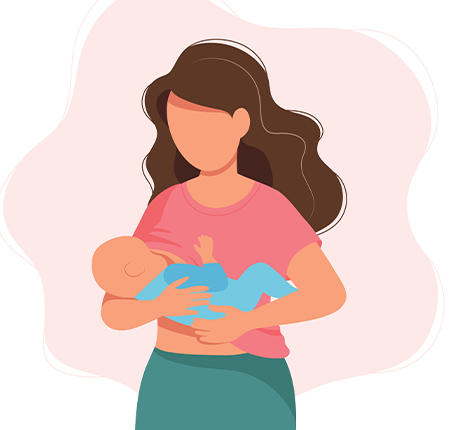
It is also normal to have breast milk leaks after breastfeeding, and you can use breast pads or special bras to avoid staining. Be careful, however, to choose only organic cotton materials, not plastic, as the latter can irritate the nipple. Even after breastfeeding you can use lanolin to relieve pain and protect the nipple.
Last but not least, during the entire period of breastfeeding, it is good to increase your caloric intake by 300-500 calories, to be well hydrated and to have a diet as balanced as possible, with many vitamins and minerals to support breastfeeding. It is always good to consult your doctor so that he can recommend the most suitable supplements if they are needed in your diet.
Uterine contractions
Uterine contractions in the first days postpartum are still normal and necessary. They resemble menstrual cramps and compress blood vessels to prevent excessive bleeding.
If the pain is too strong, the doctor may recommend an analgesic. If, on the other hand, you have increased sensitivity in the abdomen and a fever, you need an urgent visit to the doctor because they may indicate a urinary infection.
Urinary problems / urinary incontinence after childbirth
Since we still got to the urinary problems, let's talk about them too. Postpartum, you may experience difficulty urinating or, on the other hand, urinary incontinence.
Difficulty urinating occurs as a result of tissue damage around the urethra or bladder, or simply as the body's response to the fear of the stinging sensation that occurs with urine leakage. Normally, this difficulty goes away on its own within a few days, and you can relieve it by pouring a little warm water over the vulva while urinating.
Urinary incontinence is also normal after childbirth, because the pregnancy affected the muscles and tissues in the area of the bladder and urethra. So when you laugh, sneeze, cough or cry, you may lose a small amount of urine. And this situation goes away by itself in about 3 months, during which absorbent pads to prevent leaks and Kegel exercises to strengthen the pelvic muscles will be helpful.
Hemorrhoids
Strong pushing during childbirth can cause or worsen hemorrhoids. You could be in this situation if you feel a swelling in the anal area or pain during a stool. Anesthetic gels, cold compresses or warm sitz baths can help relieve the pain caused by hemorrhoids. Drinking plenty of water and eating a high-fiber diet with plenty of vegetables, fruits, and grains will also help reduce pain.
Anal / fecal incontinence after childbirth
Anal incontinence (faecal or transit) occurs especially if you had a very long labor, when you practically can no longer control the elimination of stool and gas. As with urinary incontinence, Kegel exercises can help you strengthen your muscles - but it's important to talk to your doctor if the situation persists to find a solution together.
Changes in skin & hair
Stretch marks are among the most common changes in the skin after childbirth, in the area of the abdomen, breasts, thighs and buttocks, respectively the areas where the skin was more stretched during pregnancy.
As for the hair changes, pregnancy came with an increased level of hormones. This prevented hair loss and thickened it. Postpartum, the hair begins a process of replacement, which means that it thins, loses its rich appearance and falls out in excess. This process can take up to 6 months, but the hair will return to normal after that. To improve all these changes, give yourself the most delicate care:
Trim your hair periodically to make it easier to care for it;
Do not use chemical treatments that will thin/damage it even more;
Comb carefully and use the cool function of the dryer;
Use shampoo only when necessary (avoid excessive washing);
Eat lots of fruits and vegetables.
Increased fatigue level
Tiredness is one of the most normal conditions when you are a new mother, especially if the baby disturbs your sleep during the night. Blood loss and the experience of childbirth can also make you feel tired.
Be patient with yourself, understand yourself and give yourself time, without judging yourself that your energy level is not the same as it was before pregnancy. Try to get as much sleep as possible, especially when the baby is sleeping, and don't hesitate to ask your partner and other family members for help.
Status changes
I was talking earlier about postpartum depression, and the mood swings are not very different. Motherhood comes with strong, new and very changing emotions. You may burst into tears, feel anxious, have sleep disturbances and sudden mood swings. 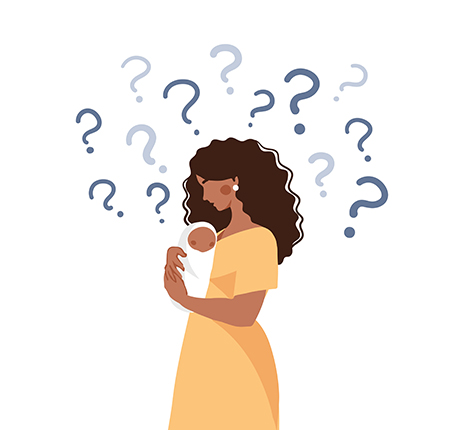
These feelings generally improve within 2 weeks as your body and mind adjust to the new responsibility of parenthood. It is very good during this time to discuss how you are feeling with your partner, family, friends or even a specialist - even more so if you feel overwhelmed by fatigue and you are also losing your appetite and enjoyment of to be a mother.
Return of menstruation after childbirth
Each body has its own rhythm to recover, and the time for the return of menstruation varies from one woman to another, being also influenced by breastfeeding. Although it is possible for your period to return 6 months to 1 year after giving birth, it normally returns after 6-8 weeks if you are not breastfeeding. Otherwise, menstruation may be absent throughout breastfeeding. Also, the amount, composition and taste of milk can change when menstruation returns, due to hormonal changes.
Don't panic if your first postpartum periods are different from how they were before you got pregnant - this is normal too:
The menstrual cycle may be irregular;
Menstrual flow may become more abundant;
Small blood clots may appear;
Menstrual pains can be stronger.
If you want to talk more about the menstrual cycle, in a previous blog post I covered everything you need to know about menstruation , so we look forward to talking openly about that as well.
Retraction of the uterus after childbirth
After growing for 9 months with your baby, your uterus will need time to return to normal after birth. Let's see how long it takes and what to expect during this transition period.
How long does it take for the uterus to recover after giving birth?
The contractions and relaxations of the postpartum uterus are what cause the pain after birth, but they also help the uterus retract. It will take 6-8 weeks to return to normal size. During this time you may experience severe pain, bleeding, heavier periods than normal and vaginal discharge.
Infection of the uterus after childbirth
Shortly after giving birth, some women may develop puerperal endometritis, an infection of the uterine lining or upper genital tract. The infection is caused by bacteria that were either already in the body before birth or got there during birth.
Signs and symptoms of uterine infection after birth include fever, chills, headache, abdominal pain, rapid pulse, and changes in lochia (becoming foul-smelling). You need to see a doctor to avoid complications. It is treated with antibiotics, and the symptoms are relieved with anti-inflammatories, ice packs, diet, specific hygiene recommendations and other local treatments.
Postpartum control
Postpartum control is usually done 6 weeks after a normal birth, or 1-2 weeks after a caesarean birth. During the consultation, the doctor will monitor how your body recovers after giving birth, checking:
What tension and weight do you have;
If your episiotomy wound has healed, if you had one;
How to heal the scar if you gave birth by caesarean section;
The appearance of the breasts;
The appearance of the vagina and cervix through a speculum examination.
Also at this postpartum check-up you can ask the doctor any questions you have regarding the recovery of your body or the care of the baby. Now is a good opportunity to talk about your emotions too, if you feel that they are overwhelming you. Because you will be able to be directed further to the help you need to successfully face the new challenge of being a mother.
Postpartum Care - Helpful Tips & Hints
Finally, remember that postpartum is about recovery and healing, and taking care of yourself is just as important as taking care of your baby. Sure, it sounds easy in theory, and the challenge of being a mother can overwhelm you, so here are some useful tips to help you get through this period as easily as possible:
Rest: Childbirth is not an easy experience, and neither is the postpartum period. It's tiring, and you most likely didn't get enough sleep in the hospital. Even at home, sleep is not complete during the night if the little one wakes you up. Therefore, try to sleep as much as possible, adapting your sleep according to that of the baby. As much as possible, sleep when he sleeps, because sleep will help you recover.
Wash your hands: it may seem like a trivial habit, but it is a crucial detail that will help you maintain proper hygiene and prevent infections. Wash your hands before and after going to the bathroom, but also after changing your baby's diaper or before feeding him.
Avoid lifting weights: Especially after a cesarean delivery, it is good not to lift anything heavier than your baby.
Avoid climbing stairs: Especially in the first week postpartum, limit climbing stairs as much as possible until your body recovers.
Also consider contraception: even if your period hasn't returned yet, it's possible to get pregnant again as soon as your doctor says you're ready to resume your sex life. It is good that at least 18 months pass before a new pregnancy, so choose a suitable contraceptive method in time to avoid a pregnancy that will put your health at risk.
Establish a routine with your baby: As you get to know and understand your little one's habits, establish a routine for breastfeeding/feeding and sleeping. It will also help you to organize your sleep and daily activities better.
Patience, understanding and communication: Be patient with yourself and your baby, limit visits if they become tiring, and don't hesitate to ask your partner or family members for help during this time, whether it's shopping, cleaning, cooking or even babysitting . Everything doesn't have to be perfect, you just have to get through this period in the best possible health for both you and your baby.






















